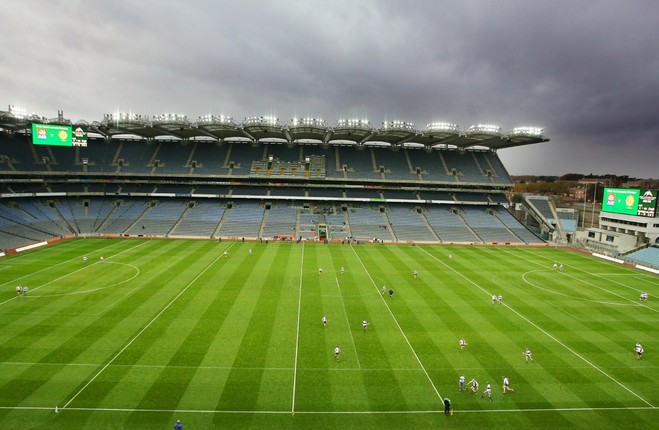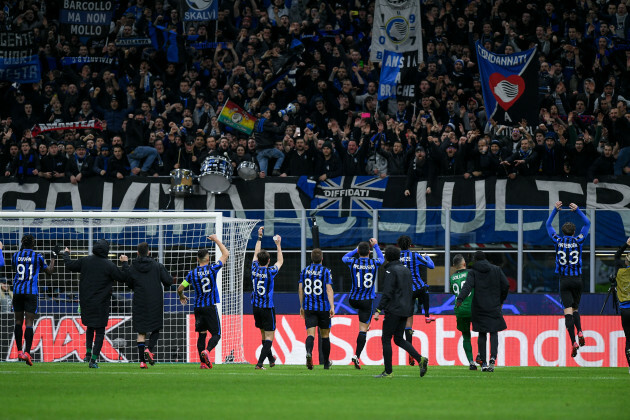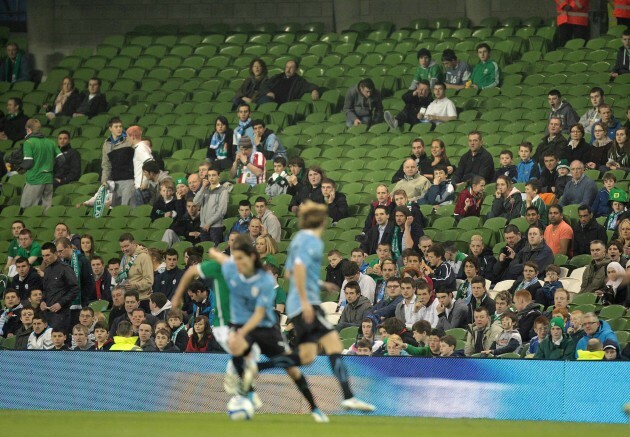A PROFESSOR WITH over 20-years-experience working in disease control believes it could take four years before it is safe for Irish sporting fixtures to be played in front of packed stadiums again.
Gerry Killeen, the AXA Research Chair in Applied Pathogen Ecology at University College Cork, has also stressed the need for mask-wearing to become compulsory for any fan attending a match.
A former rugby player at grass-roots level, Professor Killeen spent nearly 20 years working in sub-Saharan African countries combating the spread of malaria. He also spent time in Haiti when the Zika outbreak spread there.
His concerns surrounding the spread of Covid-19 stem from a career spent in the world’s most vulnerable societies where disease has ravaged regions. And while he’d like to see sport return as soon as possible – “it is one of the things I really miss, going to games, shouting on my team” – he’s wary.
Sports events are super spreaders,” Professor Killeen said.
The best-case scenario, he argues, is a fairly bleak one. Unless a vaccine is found or the virus is eliminated from Ireland, severe precautions are advised. Sport could go ahead with spectators, he suggests, but only under certain conditions – namely the wearing of masks by patrons and social distancing rules being enforced.
Professor Killeen said: “Firstly, everyone would have to wear a mask. That must be mandatory. Certainly there can be no pints served in stadiums, stuff like that. Social distancing rules will have to be adhered to. If there was to be a 1m distance between spectators, then – at a guess – we may be able to see a game played in Croke Park or the Aviva Stadium with 50 per cent capacity but I’m not qualified to speak about specific stadiums and what it is possible to do within those grounds.
“I remember being at the Munster/Leinster game at Thomond Park in December 2018 and being covered by droplets. That’s one the reasons we all go to matches, to shout for our teams, disagree with refereeing decisions and generally be as vocal as we can. All that increases the number of droplets entering the air, and let’s not forget all the big COVID clusters already documented have stemmed from choirs and churches where people really stretched their vocal chords.
“It’s one of the reasons why sports events are dubbed super spreaders because you have thousands of people congregated in a tight area. The decision to allow Cheltenham to go ahead resulted in lives being lost.”
Another sports event, the Champions League game between Atalanta and Valencia in February, is considered a huge contributor to the problems which beset Bergamo, in northern Italy. Within five weeks of that game, 2,290 people had lost their lives in a town of 120,000 people. “That match was a loudhailer for spreading the coronavirus infection,” said Professor Francesco Le Foche, an immunologist in the infectious diseases centre at Rome’s Policlinico Umberto I. “A biological timebomb,” said the Bergamo mayor.
It is a key reason why Killeen says that a person with the virus attending a sports game has the potential to be a ‘super spreader’. “A football match could kick off a huge epidemic surge. Based on the best projections I’ve seen for strategies to “flatten the curve” and “live with the virus”, it will be four years plus before you can even think about full capacity crowds being at Irish sports events again.
“The problem with these things is they are unpredictable. Little chance events can lead to big epidemics. For example, in South Korea, a Zumba class resulted in 112 people catching Covid-19. In France, they believe a huge number of cases stemmed from one church, where 2000 people congregated for a week, choirs singing in clusters, spreading droplets. The Christian Open Door Church is in Mulhouse, along their border with Switzerland and Germany, and it is striking that this is the corner of France hit hardest by the epidemic.
“When you break up the economy into different, small elements, you get schools going back, pubs re-opening, people travelling on public transport. If someone is infected and goes to a game, they can spread it (the virus) to those around them. Then it’s brought home to grandparents. When there is a spike in cases, the people who deal with the consequences are healthcare workers, carers, those with underlying conditions. I’ll be honest this thing scares the bejaysus out of me.”
The implications of a world where half-empty stadiums become the new norm are obvious. Jobs would be lost, wages cut.
“In all epidemics, you get well-meaning people who argue with each other about what is the right thing to do,” he says. “My fear is we will learn the hard way. When we talk about living with the virus, the new normal isn’t very normal. And this could go on for an awfully long time.”
There is an alternative option, he argues – one that involves short-term pain for longer-term gain. “Elimination (of the virus in Ireland) is possible. We could get this down to zero and would then need to hold it at zero for a number of days. I’m optimistic that it would take two to four months to get there. But it has happened elsewhere in Greece, New Zealand and Iceland. They have led from the front, have closed their borders, killed the virus. They now decide who comes into their country.
“I’ve lived through a cholera epidemic in Tanzania. It took six months of restrictions and there was hardship. But after six months, things opened again. There was a happy ending. That can be the case here, too, but these things don’t happen by themselves. You have to take measures. Everyone has to buy into them.”
Another hope is that a vaccine is soon found. “There are reasons to be optimistic (about a vaccine becoming available to deal with this disease), but that still leaves us with odds of about 50-50,” says Professor Killeen.
“But how soon can it be trialled, and how soon can we make enough for eight billion people to be vaccinated? Two years would be a super-human achievement and would break all records in history.”
Instead the picture he paints isn’t the one we wanted to see. “The best-case scenario is we could have 50 per cent capacity at our sporting grounds – everybody about a metre or so apart, everybody wearing masks, and this could go on indefinitely. To say this new normal would last for about four years is not an exaggeration.”
The implications of this scenario unfolding would be disastrous for Irish sport. Of course it should also be stressed that the Professor is delivering an opinion and that events may unfold more kindly. There may not be a second wave. Yet, his opinion is weighty, coming from years specialising in the area of disease control.
“Look, I’m busting to get out again and watch a game,” he says. “My kids are desperate to play with their pals once again. But we are five per cent of the way through this. If you only suppress it and don’t eliminate, it just takes longer for the epidemic to run its course, meaning about 200,000 of us will find ourselves in an ICU sooner or later.
“If you wanted to split society, this virus has got it right. It doesn’t affect all age groups therefore people have different opinions on what should be done. If it was a disease that affected every age group equally, then you would get a different outlook. Everybody would reach consensus very quickly.
“My argument is that a prolonged lockdown could eliminate the virus. In Uganda, where they’ve seen what Ebola looks like, their experience in dealing with a crisis has stood to them. They’re on top of this virus. They’re eliminating it. Ireland could eliminate it too.”



